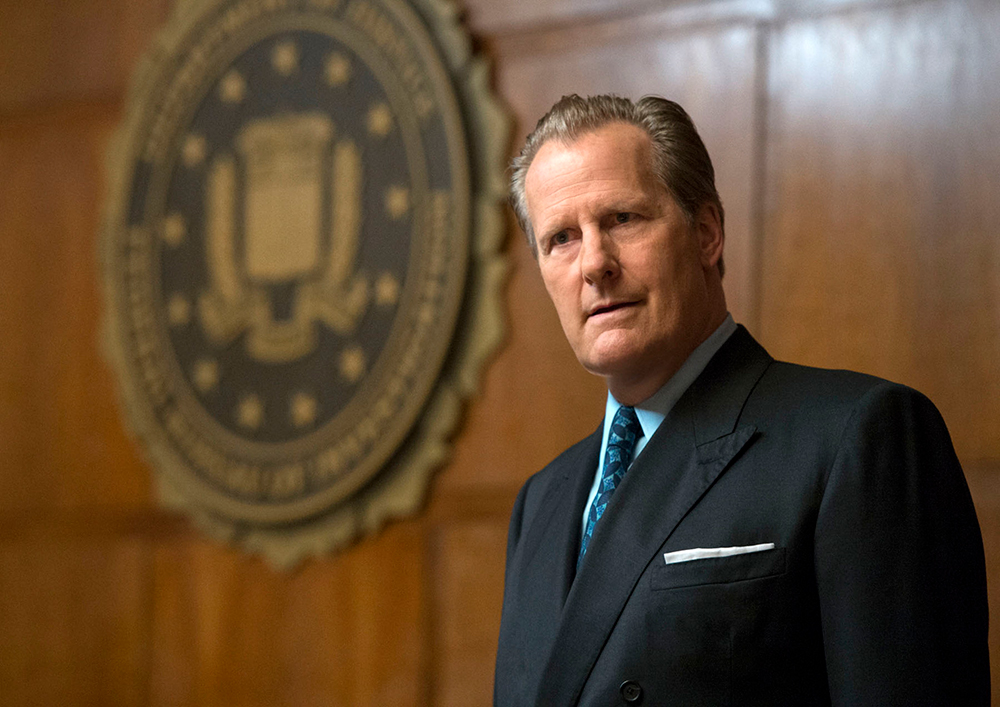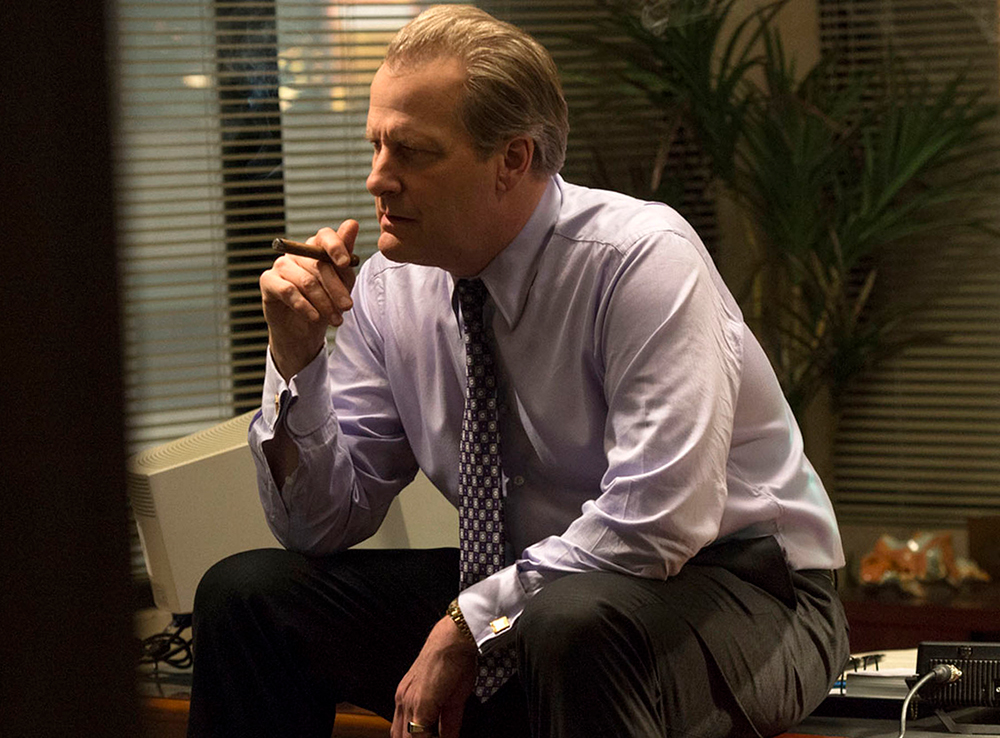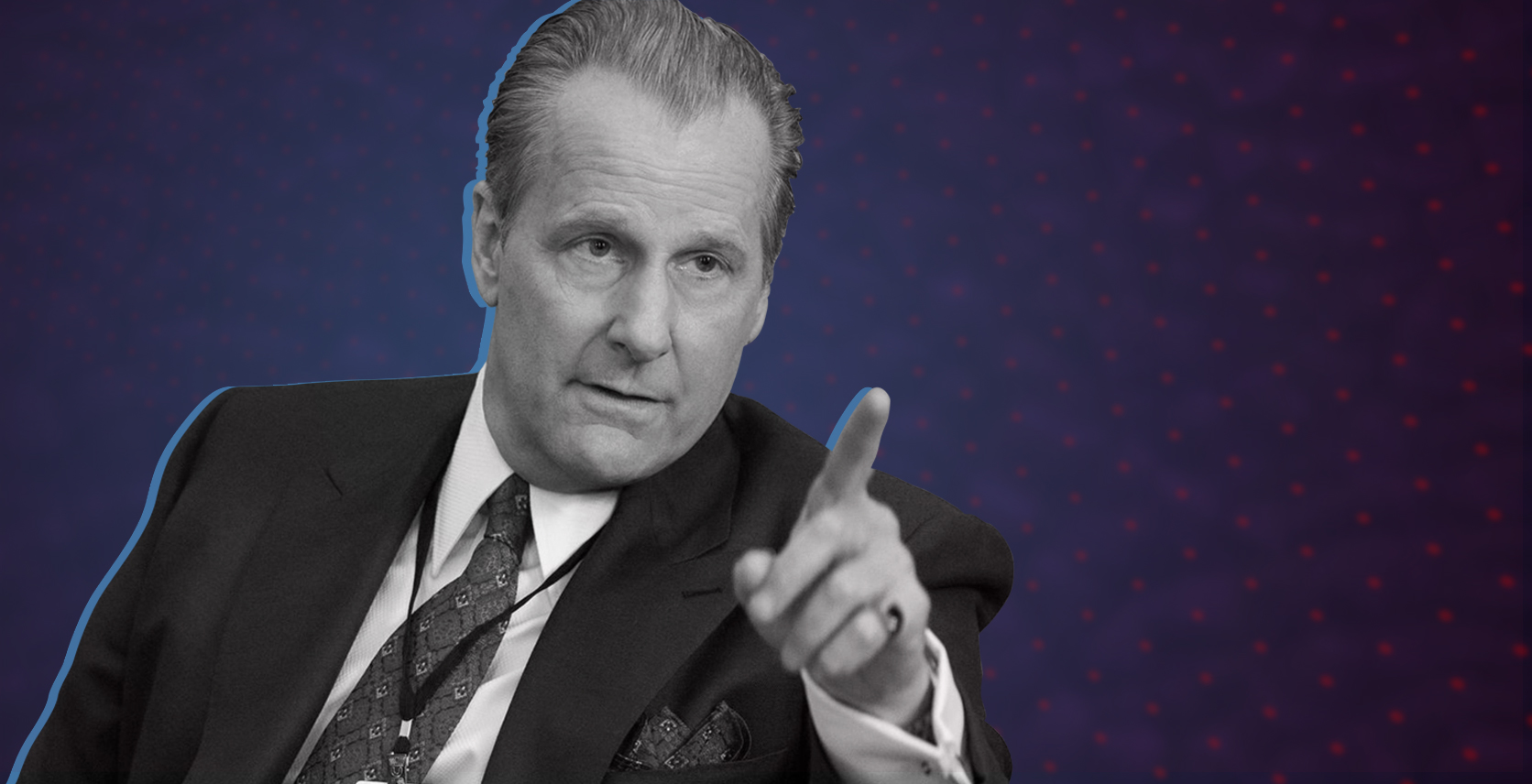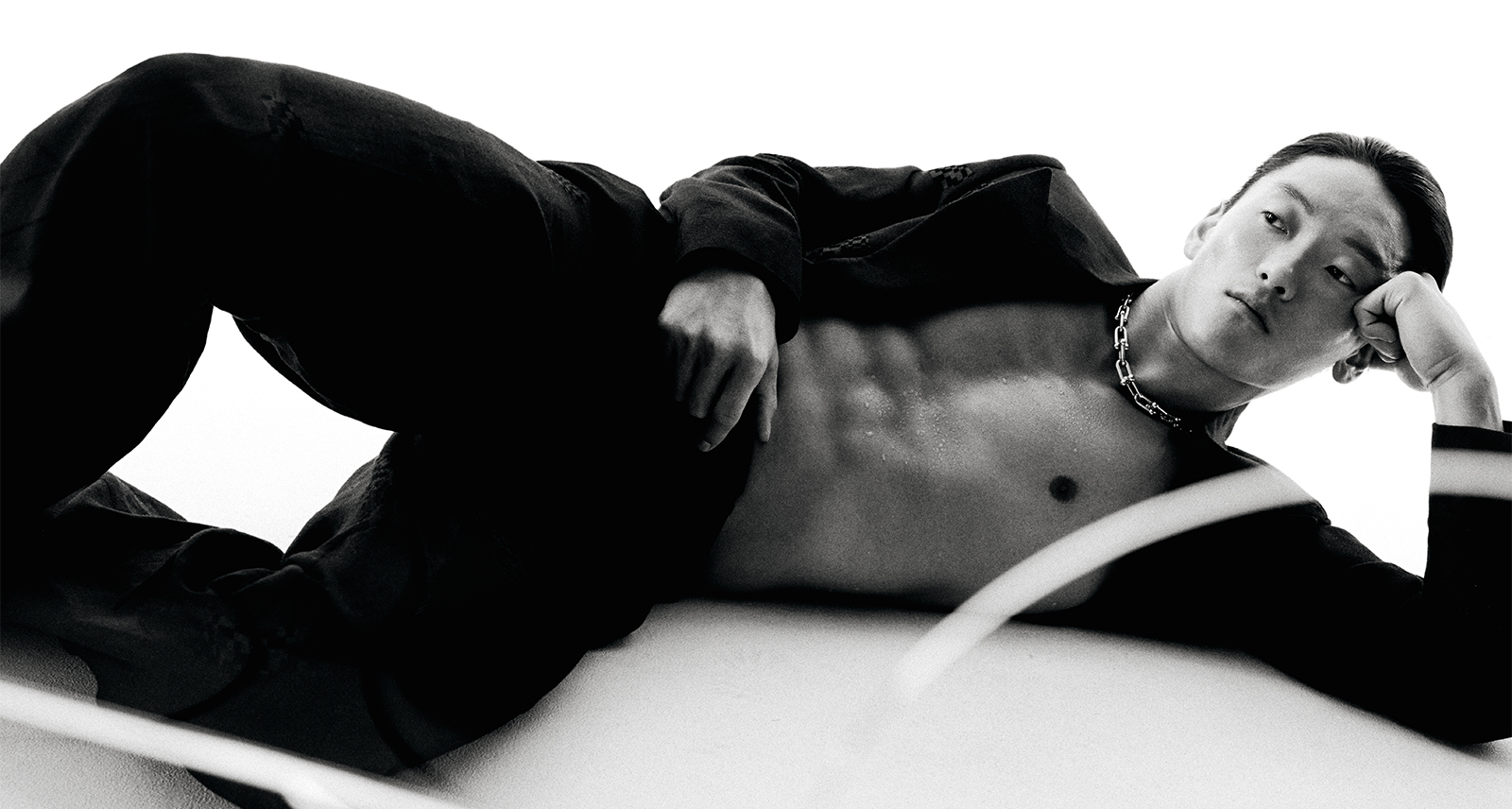Jeff Daniels on How to Fix America
Jeff Daniels sounds dead tired. I suspect it’s not simply because I’m calling him at his Michigan home in the small hours. Perhaps his workload is to blame: in the last four years, he’s reprised his role as laxative-swigging buffoon in Dumb and Dumber To, won an Emmy as a hard-boiled anchor in The Newsroom, stolen critical hearts in Broadway’s Blackbird, and found time to tour with his folk-country band, which is a thing. This year alone, he may well add two more Emmys to his CV — for his turns as a grizzled outlaw in Netflix western Godless, and a frustrated FBI agent in Amazon Prime Video’s 9/11 drama The Looming Tower. Woof. I’m spent just listing all those things.
Another theory: Daniels is exhausted because his country is on fire. The 63-year-old, after all, has spent a great deal of time thinking about America, what with all these political dramas he’s starred in. It could be he’s been playing the whole jaded patriot thing so well that it’s started to bleed into his actual personality. Just a few months ago, while appearing on The Late Show with Stephen Colbert, he essentially launched into an IRL version of Will McAvoy’s “America is NOT the greatest country anymore” monologue, cataloguing all the virtues he believes America’s lost since Trump took office. To be fair, things haven’t been looking hella virtuous stateside. No wonder he’s so wiped.
Or! Maybe Jeff Daniels is just tired of doing stupid phone interviews. In any case, when we speak, he sounds worn down by a lot of shit — post-9/11 America, social media filter bubbles, Fox News, the convolutedly-coiffed guy in the White House. And yet, some-crazy-how, he ends our convo sounding remarkably hopeful — about today’s youth, about streaming services, about the future of the world’s former greatest country. So, uh… happy Fourth of July?
What can you tell me about John O’Neill, the guy you play in The Looming Tower?
Well, Lawrence Wright wrote a book in 2006 that won a Pultizer and in it he describes John O’Neill, as well as everybody else. O’Neill was a guy that was kind of a bull in a china shop. He was brilliant but he had a way of burning bridges with people that he worked with. It was his way. His partners were great about telling me about what he was to the men and women of the FBI and how he’d do anything for them. But, you know, if you got in his way he’d run right over you. So he was one of the people saying, “Watch this Bin Laden guy, there’s something going on.” And there were a lot of threats going around and Bin Laden was just one of them. But John stayed on him and everyone else said, “What makes him so different from the other threats?” They made it difficult for John to get listened to.
Did this show change your understanding of what happened on 9/11?
It changed [my take on] the lead-up to it. In hindsight, you can go back and analyze decisions and choices, but it was definitely an examination of, as Richard Clarke said in front of Congress, “Your government failed you.” And it did. I think one of those things that makes the show resonate right now, is in the U.S. we have to ask ourselves if we’re better off. Did we learn anything from that? And I’m sure the FBI and the CIA did. I can’t imagine that they aren’t better for that, but I’m not sure about that, you know, in the White House. And I think that’s why it’s got people in America a little afraid. People in America are looking around going, “Are we better off or worse?” I’m not sure we’re safer. It’s a scary time in the U.S. The show kind of goes, ‘This is what can happen when the government’s firing on all cylinders and working together, supposedly.” Well, 9/11 happened. Now how are we?

There used to be this illusion about American politics, especially pre-9/11, that everyone working in public office is devoted to working to the same end, which is the public good. Whereas Wright’s book shows there’s a lot more power-jockeying going on, and—
It shows what can go wrong when the personalities overtake policy. And, certainly, the CIA and the FBI — and I’m no expert — but they have different ways of going about the same thing, which is protecting the United States. And the CIA’s method of going about gathering information and informants and fugitives and all of that is different than the FBI’s, which is maybe more aggressive. Certainly, that’s what the case was leading up to 9/11. The FBI’s guys want to come and, like John O’Neill does, say “Go arrest everybody!” Whereas the CIA, they tend to kind of let information gather. That’s what they were doing back then.
As you’ve gotten older it seems you’ve been acting, almost exclusively, in really smart, high quality shows. Do you just have more quality control over the stuff you do these days?
No! HBO, Showtime, Netflix, Amazon, and Hulu happened, to name a few. And that’s where all the writers went. I have yet to be on one of those shows where the writers didn’t have the most power and the most creative control. That’s one of the great things about this whole big boom of television — it’s for actors, not stars. Because the stories are more complex, they’re taken out over six, seven, nine, 10 hours of a season. Godless was seven hours, Newsroom was nine at it’s most, and Looming Towers is 10. Looming Towers is a 10-hour movie. You can let the stories get complex, you can let the characters get complex, because you’re shooting the novel, not a chapter in it that you’re condensing. It’s just a wonderful time to be an actor. It really is.
Hollywood always wants its stars to keep doing the shit they did before. Were you at all worried, after doing Dumb and Dumber in the ’90s, that’d you’d get pigeonholed into playing goofy, stupid dudes?
No. You know, the things leading up to Dumb and Dumber were Gettysburg and Purple Rose and Terms of Endearment. I’d already established myself as that. Dumb and Dumber just stretched the range. It goes from Harry Dunne to Gettysburg, or later on, The Newsroom, and it’s all part of the plan to create as wide a range as possible, because in between that 180-degree range is what you’re trying to get: a lot of jobs. If you can do that and you can do this, then you can do this thing in the middle. So it was more of a career move. And I loved doing it! Loved working with Jim, loved what the movie does, love that it makes people laugh. You know, there’s value in that.
“I have no idea who’s going to fix it or how, but I have a feeling it’s going to start in November 2018. If it doesn’t, then we deserve the country we’ve got.”
Absolutely. I grew up laughing at Harry and Lloyd on repeat. Are there any prospects of ever doing a third Dumb and Dumber movie?
I have no idea. That’s up to… we did the second one and I don’t think we lost money. [Laughs.] My guess is that we’re done.
Well, speaking of comedy and drama, what are your thoughts on the Trump administration right now?
I think, like a lot of people in the world, we’re all watching to see who steps up. Who is going to be the hero? Who’s going to step up? Who’s going to stop this? Or are we just going to all sit back and let it happen? I know November of 2018 is going to be a very interesting month. And anybody who is not happy with what he and some other people are doing, and how they’re going about it, will need to do something about it. I know many people feel it’s not representative of a lot of us. So we’ll see what happens in November 2018. But it feels like there’s a movement going on against it. So that’s going to be a big month.
Freak scenario: Trump is re-elected in 2020. What do you think the consequences would be for America if that happens?
I don’t want to get into all of this.
I’m sorry.
I mean, you don’t know! You can’t even go that far. You can’t. Bob Mueller is going to drop a report on a desk pretty soon. I think everybody in the world is going to know what’s going on at that point. But until that happens, it’s just, everybody’s making a lot of noise. So I’m not even thinking beyond. I’m waiting for that to happen.
With all the streaming services out there now, we’re seeing more audience fragmentation than ever. There’s no more mainstream, where people are all bonding over the same show. Is this ultimately a good or bad thing?
Well, its a whole new world and we’ve got so many more options. Back when you were watching Cheers, how many channels were on your television? Not too many. And now? Hundreds. That’s just on cable, and now comes Hulu, and Apple TV. What’s interesting is they can do niche programming. They don’t have to have a show that plays to as broad an audience as possible, like the networks do. They can aim for that audience that reads books and really would love to binge-watch something as complicated as House of Cards or Newsroom or Looming Towers or Handmaid’s Tale. They’re willing to sit down on the couch and read a book for 10 hours. That’s on your television! What used to be independent film in the ’70s — I mean it’s still around, but it feels like all that edge and all that challenging material, it’s got a home in streaming television. I’m glad.
I guess one thing that worries me about it is people are starting to watch things that only reinforce their existing beliefs.
Welcome to, you know, we can thank social media for that. People have always gravitated towards what they liked, versus being force-fed something that was good because a lot of people liked it. The library’s got a lot of books in it, not just the top 10 books on one shelf that everybody reads. I don’t mind it. There’s more creative choice out there for a viewer. I mean, can you get lost in your bubble? Yeah. But suddenly you’re watching documentary films because it’s on your television set that you never would have gone to a theatre to see, just because you haven’t. I think it’s a wide-open frontier. Not only for actors and writers and directors but also for viewers. I don’t think it’s a bad thing.
Do you have any thoughts on the Roseanne reboot?
I haven’t seen it.
I think that show, and maybe Tim Allen’s Last Man Standing, could be examples of these sorts of programming filter bubbles…
Well, that’s where we are. That’s where we are on everything. You go on Fox News or right-wing social media, and you go, “This is what these people believe. As strongly as I believe in other things.” And there’s no talking to some of them. You know, I don’t know what they’re complaining about. They got their own television channel. It’s called Fox News. I don’t know what they’re bitching about.

How do we fix all this?
Not up to me. I’ll tell you how you fix it in the country, maybe: it’s the young people. You know, I’m in my sixties and you look around and go, “Well kids, it’s your country now.” I think we’ve done plenty of damage at this point. But I’m really encouraged by the young people, the women, the movements that are going on with the gun protests. The minorities of America have a much different viewpoint on guns than I do or I’m aware of. These are revolutionary times. They really are. So I have no idea who’s going to fix it or how, but I have a feeling, again, that it’s going to start in November 2018. It has to. If it doesn’t, then we deserve the country we’ve got.
Maybe one positive about Trump being elected is that it’s lit a fire under people’s asses.
They have something to go against now. They have an obstacle to overcome. Yes they do, yes they do. And we do, and it’s a very specific one, and we’ll see what happens. But I’m encouraged by the compassion that is in this country and the people that want this to come to an end — that want to change what’s going on. I’m really encouraged. I think it’s 53 per cent of the population that voted last election. That means 47 per cent of the eligible voters didn’t vote. And there’s gerrymandering and things making it difficult, but look: you’ve got something to vote for and you’ve got something to vote against now. But you’ve got to vote.










